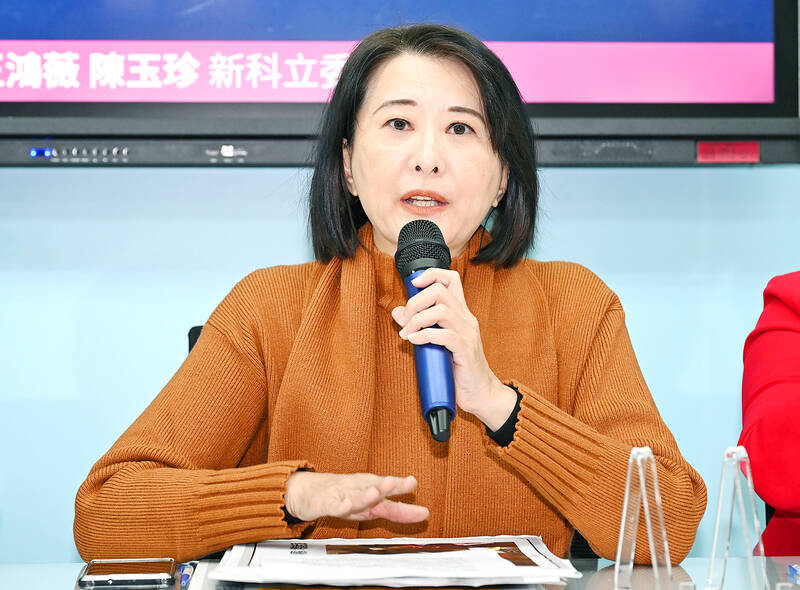Chinese Nationalist Party (KMT) legislators yesterday said they would introduce a bill to allow absentee voting when the new legislative session starts on Thursday next week.
Absentee voting would help deepen the nation’s democracy, KMT Legislator Lai Shyh-bao (賴士葆) said, urging all parties to support the measure, as it “must be done.”
KMT Legislator Jessica Chen (陳玉珍) said that difficulties in reaching polling stations in Kinmen County, which she represents, often contribute to low voter turnout.

Photo: Liao Chen-huei, Taipei Times
Allowing absentee voting would help improve voter turnout in outlying islands, Chen said.
Public service workers, such as police officers, are also deprived of their voting rights, as they could be assigned to work out of town on election day, she said.
Citing data from a 2021 Directorate-General of Budgeting, Accounting and Statistics census, KMT Legislator Wang Hung-wei (王鴻薇) said that about 2 million people would benefit from absentee voting.
KMT legislator-elect Sean Liao (廖偉翔) said he would support drafting laws to enable absentee voting, adding that this is a trending issue among democratic countries worldwide and Taiwan should not lag behind other nations.
Incoming Taiwan People’s Party (TPP) legislator-at-large Huang Kuo-chang (黃國昌) said his party would also make absentee voting a primary issue in the upcoming legislative session, adding that voters in a democratic nation should not be forced to give up their right to cast a ballot if they cannot make it to the polls.
Democratic Progressive Party (DPP) legislative caucus deputy secretary-general Hung Sun-han (洪申翰) said it was more important for the public to believe in the election results than introduce new mechanisms to increase the number of voters.
Absentee ballots could introduce additional issues, such as people voting from China and how to verify those votes, Hung said.
The primary principle in creating an absentee-voting system is making sure that the voting can be certifiable and trustworthy, he said.
DPP Legislator Chang Hung-lu (張宏陸) said that he supports allowing people to be able to vote where they work rather than where their household registration is.
However, Chang said he was more hesitant about adopting a vote-by-mail system like the US has.
Whether Taiwanese in China can vote of their own free will is an issue in light of Beijing’s heavy-handed attempts to intervene in Taiwan’s elections, he said.
If the technology was mature, he would support absentee voting, but any implementation should be gradual, he said.
In other election news, incoming TPP legislator Vivian Huang (黃珊珊) said that some voting station staff had tried to stop monitors from recording the ballot-counting during the Jan. 13 presidential and legislative elections.
She also said that at a voting station in Tainan’s Anping District (安平), the police were asked to remove a monitor, adding that the party would send a letter to the Central Election Commission (CEC) on such issues.
CEC Vice Chairman Chen Chao-chien (陳朝建) said that the commission is open to suggestions about improving the election process and would forward opinions on legal amendments to higher authorities for discussion, the Chinese-language United Daily News reported.
Additional reporting by Chen Cheng-yu

CHAOS: Iranians took to the streets playing celebratory music after reports of Khamenei’s death on Saturday, while mourners also gathered in Tehran yesterday Iranian Supreme Leader Ayatollah Ali Khamenei was killed in a major attack on Iran launched by Israel and the US, throwing the future of the Islamic republic into doubt and raising the risk of regional instability. Iranian state television and the state-run IRNA news agency announced the 86-year-old’s death early yesterday. US President Donald Trump said it gave Iranians their “greatest chance” to “take back” their country. The announcements came after a joint US and Israeli aerial bombardment that targeted Iranian military and governmental sites. Trump said the “heavy and pinpoint bombing” would continue through the week or as long

TRUST: The KMT said it respected the US’ timing and considerations, and hoped it would continue to honor its commitments to helping Taiwan bolster its defenses and deterrence US President Donald Trump is delaying a multibillion-dollar arms sale to Taiwan to ensure his visit to Beijing is successful, a New York Times report said. The weapons sales package has stalled in the US Department of State, the report said, citing US officials it did not identify. The White House has told agencies not to push forward ahead of Trump’s meeting with Chinese President Xi Jinping (習近平), it said. The two last month held a phone call to discuss trade and geopolitical flashpoints ahead of the summit. Xi raised the Taiwan issue and urged the US to handle arms sales to

BIG SPENDERS: Foreign investors bought the most Taiwan equities since 2005, signaling confidence that an AI boom would continue to benefit chipmakers Taiwan Semiconductor Manufacturing Co’s (TSMC, 台積電) market capitalization swelled to US$2 trillion for the first time following a 4.25 percent rally in its American depositary receipts (ADR) overnight, putting the world’s biggest contract chipmaker sixth on the list of the world’s biggest companies by market capitalization, just behind Amazon.com Inc. The site CompaniesMarketcap.com ranked TSMC ahead of Saudi Aramco and Meta Platforms Inc. The Taiwanese company’s ADRs on Tuesday surged to US$385.75 on the New York Stock Exchange, as strong demand for artificial intelligence (AI) applications led to chip supply constraints and boost revenue growth to record-breaking levels. Each TSMC ADR represents

Pro-democracy media tycoon Jimmy Lai’s (黎智英) fraud conviction and prison sentence were yesterday overturned by a Hong Kong court, in a surprise legal decision that comes soon after Lai was jailed for 20 years on a separate national security charge. Judges Jeremy Poon (潘兆初), Anthea Pang (彭寶琴) and Derek Pang (彭偉昌) said in the judgement that they allowed the appeal from Lai, and another defendant in the case, to proceed, as a lower court judge had “erred.” “The Court of Appeal gave them leave to appeal against their conviction, allowed their appeals, quashed the convictions and set aside the sentences,” the judges